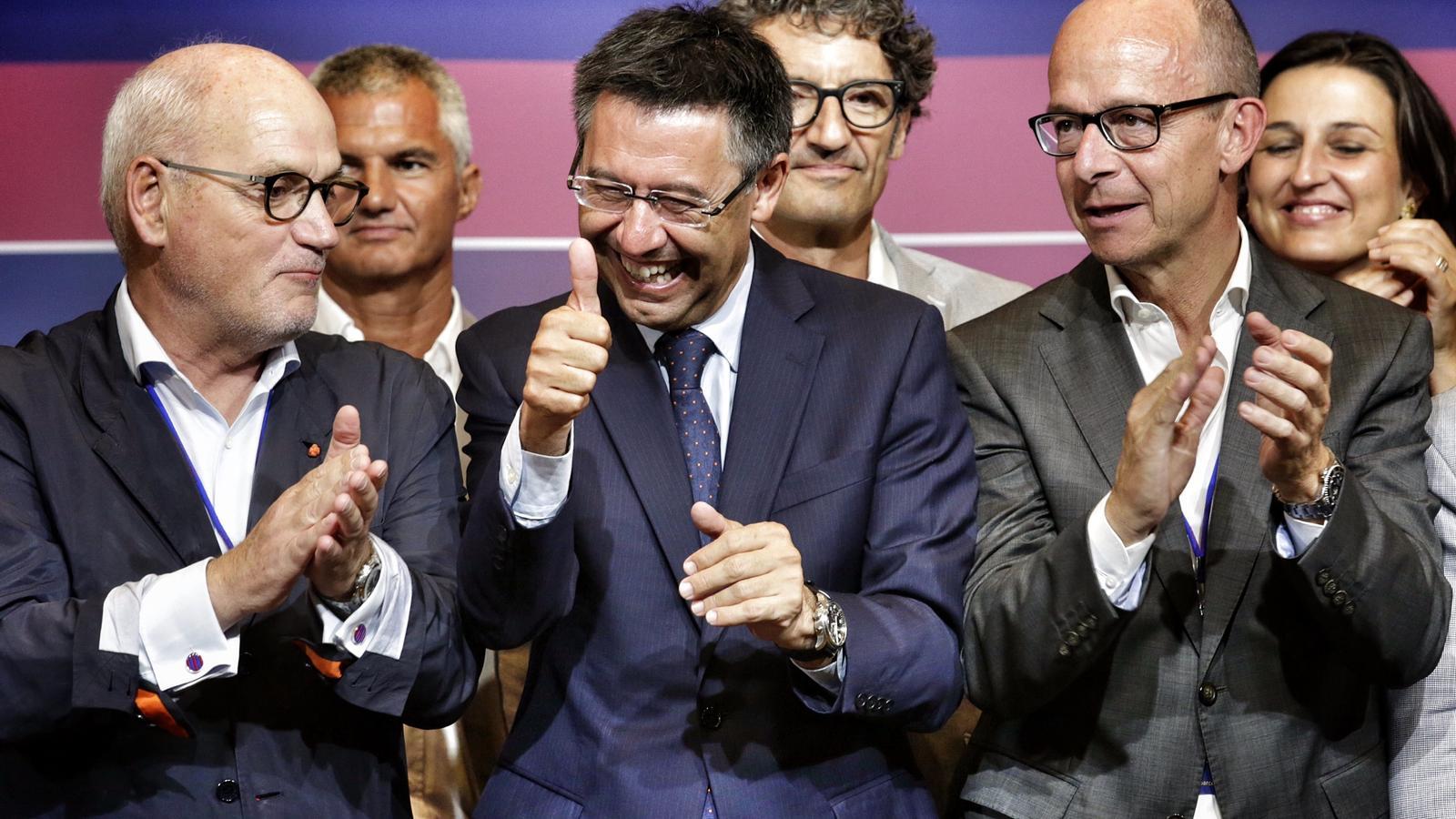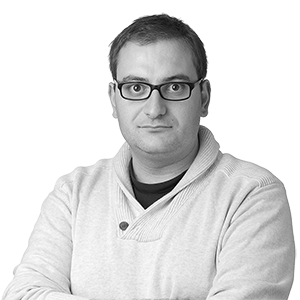"I had a 0.001% chance and I won."
It's been 10 years since Josep Maria Bartomeu became president of Barça.


BarcelonaJanuary 2015. Barça is a powder keg. On the 5th, the team holds its traditional open training session at the Miniestadi with one notable absence. Leo Messi is absent. He claims gastroenteritis, but no one listens to his story, and it's interpreted as retaliation for having been a substitute the day before at Anoeta in their defeat to Real Sociedad. That same day, the sporting director, Andoni Zubizarreta, is dismissed after some of his statements were misinterpreted. The pressure was suffocating, and president Josep Maria Bartomeu, who had taken office a year earlier following the resignation of Sandro Rosell, announces he will call elections in the summer. Everyone thinks he has nothing to do. Not even he believes in victory. But, as football goes, the ball starts to roll in. Luis Enrique's Barça makes a comeback, and with Messi, Neymar, and Luis Suárez as a lethal trident, the team closes the season with a hat trick. League, Cup, and Champions League. Bartolomé is re-elected. This July 18th marks 10 years since an election that changed the club's history.
"They called me a complete idiot. Nobody calls elections when their popularity rating is so low. But there was a lot of pressure, both within and outside the club. The board members were also hesitant. It was the only solution to try and calm the atmosphere. And it worked," Bartomeu recalls in a conversation. "I believed in victory," he admits. It wasn't just a feeling. That January, Joan Laporta's team, who were hoping to return to the club's box, conducted a survey among the members. They were winning by over 60%. But as soon as Barça started winning games, everything turned around, and I'm going to say everything in April. Laporta, through his advisors, said there was no need for him to stand, that he would definitely lose," Bartomeu points out. In the end, he won with 25,823 votes, 54.63% of the vote. Laporta ended up with 15,615 (33.03%). "The Barça partner is like that.
A long campaign, with strategy, underground movements and the interference of the independence movements
Bartomeu is right when he talks about the results. But winning an election is more complex. That campaign was long, with seven formal pre-candidacies, strategy, underground movements, and even the interference of pro-independence movements in an election that took place on Saturday, July 18, the day of the Franco coup d'état. "We must admit that it caught us off guard. In January, we were sure we would win by a landslide. Then doubts arose. In the end, it was a failure," admits a person very close to Joan Laporta, the big loser in that vote. The lawyer left Camp Nou so angry that he was the only one who didn't greet the winner. He said goodbye with a "No surrender" (I don't give up) that over the years has made sense but at the time it sounded very unbelievable.
"Bartomeu would have won the elections anyway, but Laporta's arrival polarized everything," explains Agustí Benedito's campaign team. The Barcelona businessman was the third candidate, accompanied by Toni Freixa, who narrowly missed the last-minute signature cut. FCB narrowly failed to secure the necessary endorsements after a controversial recount. Meanwhile, Jordi Majó—who had already tried to become president in 2003—and a newcomer, Jordi Farré, also fell by the wayside.
Laporta was hesitant until the very end about whether to run or not.
It was difficult for Laporta to take the final step. I knew I was going to loseHe was the last to announce his presentation. "It was all very rushed and provisional. As they say, we didn't even have the headquarters ready," his team explains. "We had a hard time getting into the supporters' clubs, finding executives... everything." And Laporta, beyond his inner circle of closest confidants—with names like Josep Cubells, Rafael Yuste, Elena Fort, and Alfons Castro, who accompany him on the current board—didn't close the final meeting until the day he was due to deliver the endorsements to the club. "On the day of the presentation, we started almost an hour late. It was because the executives who had arrived at the last minute were getting to know each other and exchanging phone numbers to create a WhatsApp group," they recall.
Laporta's interventions from his headquarters on Carrer Provença in Barcelona, next to La Pedrera, were more a collection of reproaches for Bartomeu than a project for the future. Laporta and his team had emerged victorious in recent months from the liability lawsuit. They believed this legal victory would give them wings. "He surrounded himself with former players who had fallen foul of Rosell or Bartomeu. He held many events around the region and filled theaters and auditoriums. He was very popular! But then you looked closely, and of the 500 attendees, only about twenty were members with voting rights," they admit. Bartomeu, on the other hand, was much more skillful. With Jaume Masferrer as the campaign's ideologist—he would later become his chief of staff at the club—and with the skill of Jordi Cardoner—who had been rid of Nicolau Casaus and would become the future first vice president—he held small-scale events but with the right crowd. "If we had 100 attendees, all 100 would vote. And they would vote for us, of course," notes a former member of the team. Bartomeu combined events around the region with presentations at his headquarters on Balmes Street, a rented space that later became the headquarters of Ciutadans and is currently the Espanyol store.
With four final candidates, everyone was clear that Bartomeu would win and that Laporta needed a miracle. He desperately sought it, even trying to build a public image with Leo Messi, who was returning from summer vacation. It was the day of the joint candidate photo. Laporta went to the airport and arrived late to the event. While the rest of the candidates waited for him in the Camp Nou locker room, Bartomeu laughed and said out loud: "I have everything under control." It turns out that in the morning he had been tipped off that Laporta wanted to get that photo with Messi, so he pulled strings so that the Argentine, instead of leaving on foot through the private flight terminal, had a car waiting for him at the plane's steps. Thus, the meeting between Messi and Laporta, which would have been duly captured by the media, never happened.
The other bullet, the TV3 debate. "I knew I had to destabilize it at the beginning," explains Bartomeu. And he did. Right from the start, he praised Freixa and Benedito's programs. He showed Laporta a pamphlet and reproached him for having "done very little work." That drove him crazy. Finally, two days before the elections, in the midst of the independence movement's fervor, the ANC and Òmnium pulled strings in search of a last-minute alliance between Laporta and Benedito. "It was a desperate attempt, more in good faith than realistic, to bring together two other profiles linked to Catalan nationalism and form a common front. But we never seriously considered it," maintains Laporta's campaign team. Bartolomé's victory was inevitable. He was president until 2020, when the economic crisis resulting from the pandemic, the 8-2 defeat in the Champions League in Lisbon, and the conflict with Messi swept him away.
